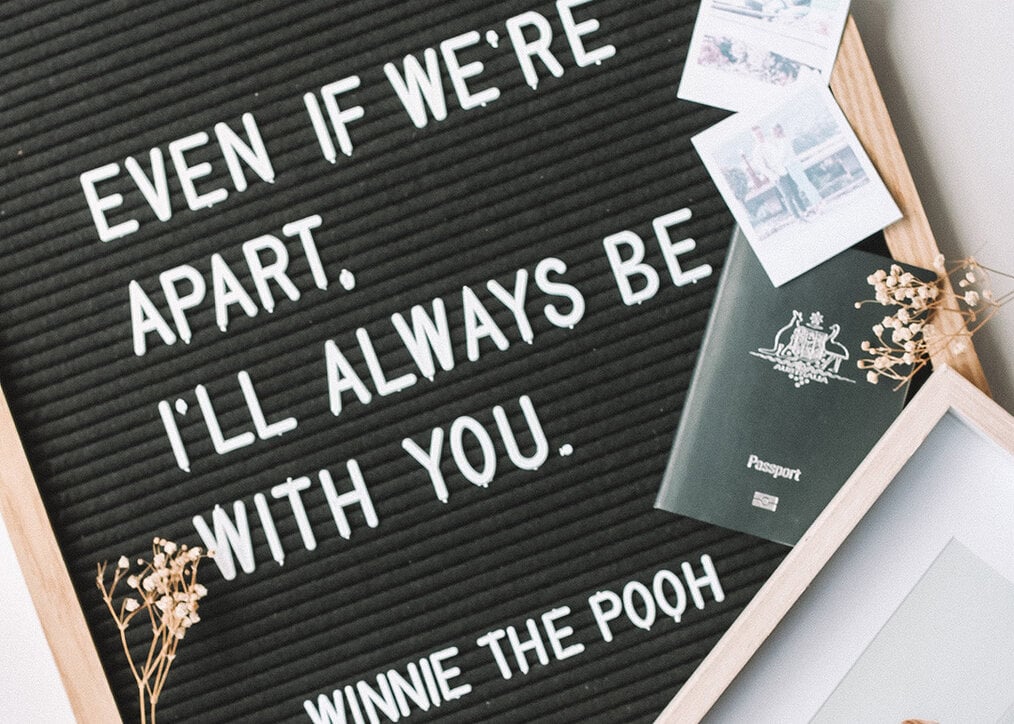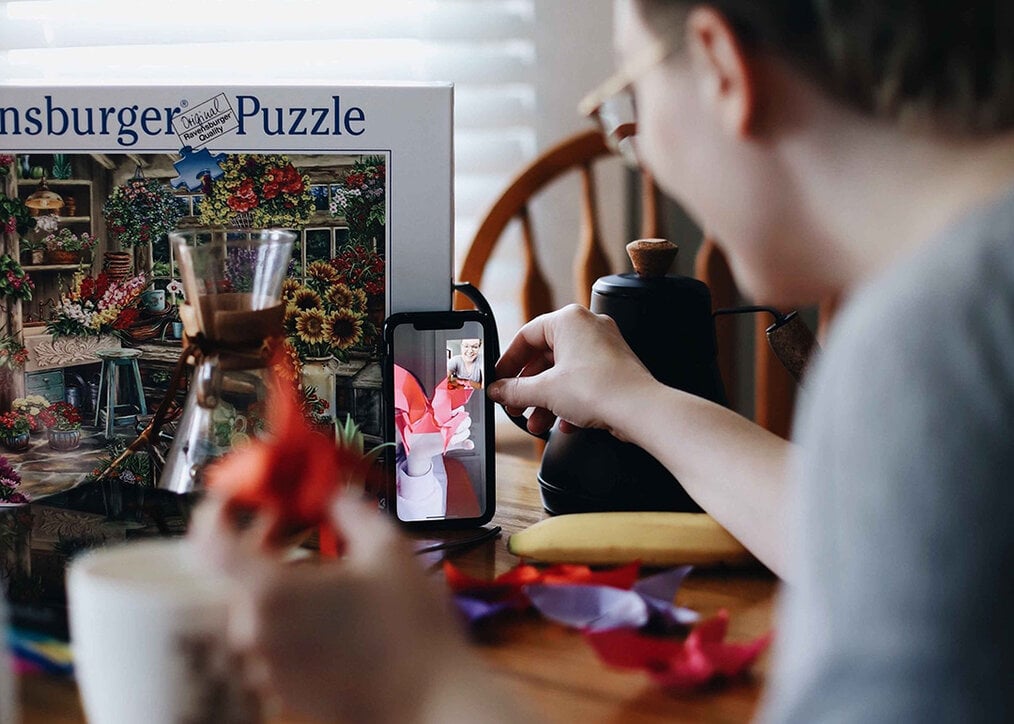
How to Keep a Long Distance Relationship While Studying Abroad
Are you concerned about how your study abroad experience will impact your relationship? Learn simple tips to stay connected with your long-distance partner while abroad.

You're about to embark on a life-changing adventure, heading overseas into the unknown with a passport in hand and a spirit of adventure. You may be looking for language classes or have already enrolled in an exchange program so that you can immerse yourself in a culture abroad. You're leaving home to study abroad.
However, it's most likely that you're studying abroad solo without your partner, and, in most relationships, that can be a significant stressor. Even with the knowledge of how challenging long-distance relationships can be, if you believe your relationship is worth fighting for, giving the dreaded long-distance a try maybe your best option.
Studying abroad is an experience that will force you to grow as a person and teach you lessons in independence, communication, and resilience. However, this also has the potential to end many romantic relationships. To help your relationship stay strong and healthy, read on to learn tips for navigating a long-distance relationship while studying abroad.
1. Invite your partner to visit you while overseas

If you and your partner can afford it, this should be number one on your list regarding sustaining a long-distance relationship. Especially if you're studying abroad a little closer to home, like in Costa Rica or ever-popular England. Including your partner in your overseas adventure is a great way to share the experience and grow as a couple.
We want to emphasize the importance of them visiting you since it's not just about seeing each other again. You want your significant other to be able to contextualize your experience abroad by getting a taste for themselves. Additionally, being away from home and your partner can add to the risk of homesickness, and a visit from your loved one can help mitigate this.
If they've met your new study abroad friends, they can make better sense of your stories and be included in them. If your significant other has been to your new favorite local coffee shop, they will be able to visualize where you're sipping your morning cup of tea as you study for your classes.
You'll both want to be able to talk about what has happened over the course of the day, and these stories will be understood much more readily if you both can picture exactly where everything is taking place. Not only that, but they'll feel more included in what may have otherwise been a very you experience. You need to make sure you both create a space for the other person in your separate worlds, and a great way to accomplish this is for them to travel to you.
2. Establish trust

One of the biggest downfalls of any long-distance relationship, and relationship generally, is a lack of trust. If you're entering into a long-distance relationship, then make sure you already have a stable foundation of trust. Keep the honesty flowing, and do not hide anything.
Think about being able to look back at your time apart and knowing that your love was strong enough to survive.
If you're having a mild flirtation with someone else or if you suspect your partner is doing so, then bring it out into the open. Discuss it together and decide that your relationship is more important than temptation. Chances are, you're just lonely, crave physical affection, and miss being with each other physically. Nothing will rot away your self-esteem and confidence faster than doubt, and the only way to get around doubt is to cultivate transparency.
Establishing consistent ways of broaching tough conversations before heading abroad is best. Confrontation is challenging no matter the circumstances, but being thousands of miles away from each other makes it very easy to internalize feelings and avoid challenging dialogues. Write down your concerns and find a time to bring them up with each other in a healthy way. If things get heated, take a break and return once you have both cooled off.
3. Communicate regularly, but not all the time!

Take advantage of your time overseas by exploring new hobbies and activities. Hang out with new study abroad friends and go on adventures to neighboring areas. Communicate regularly with your significant other, but make sure that you don't spend all of your time talking to them either. You'll miss out on what's happening around you if you do!
At the same time, since you're the one traveling abroad, it'll be easy to get caught up in your new life. New people surround you, you're trying new foods, and immersing yourself in a new culture, and you may end up losing sight of your relationship. Try to fight against this by making time for your partner when you know you'll not have another activity planned.
Schedule a regular time when you both drop whatever you're doing to catch up. Make sure you're both well-versed in time zones and transparent and honest about your schedules. Especially if you're in an area where wifi access is hard to come by or of poor quality, make sure your significant other understands this and doesn't get upset when that's the culprit behind your missed Skype date.
Regardless of how often you speak, you will need to spend some time on your relationship and keep the lines of communication open. The last thing that you want to do is cause resentment either because the other person feels neglected or because you feel like you're being held back!
4. Have patience and understanding

Even though you're in love, or at least quite fond of each other, you might find yourselves in a disagreement or even a full-fledged fight during your time abroad. While having arguments is normal -- healthy even -- for a relationship, you may realize that fighting long distance is a different experience from fighting in person. Add in any technological glitches, like a slow internet connection that cuts out every five minutes, and you could end up being in tears and ready to end the whole long-distance experiment.
Remember that whatever began the argument, your fight may actually have stemmed from a simple misunderstanding or be rooted in your frustration at being separated. Whenever you find yourself getting agitated, take a deep breath and count to ten. Don't hang up on the other person because it will worsen the situation.
Try to be fair when you're fighting, and do not resort to name-calling and being mean. Instead of raising your voice or yelling, try to calm down and either take a break and call back in ten minutes or just take a moment while still talking to the other person. Also, there is a slight delay over applications like FaceTime, so ensure you each have a platform to speak and try to avoid interuptions.
Work at expressing yourselves clearly, articulately, and recognizing when the problem is actually distance. Explain what is upsetting you rather than blaming the other person. Hopefully, this will help keep the fight from getting too nasty.
It's hard to resolve a fight when you cannot physically hold a person or kiss and makeup. You might need to think of other ways to show that you have forgiven or been forgiven. Maybe be extra verbally affectionate or even send a good old-fashioned love letter. Get creative and try to remember that, despite any differences, this person is pretty awesome for sticking out this long-distance relationship with you!
5. Make technology work for you

Utilize technology because it'll let you feel more connected. If you both have smartphones, then use WhatsApp, Skype, FaceTime, or other top apps to stay connected.
This will allow you to not only chat spontaneously throughout the day and share inside jokes or momentous events as they happen, but you can also see each other if you video call. This will help you remember who you're with and why you're deciding to be in this relationship.
While you may inevitably begin to forget little things, as long as you can keep a clear enough picture of your significant other, you might just make it through.
Pro tip: Paired is a great app for couples to stay connected and learn new things about each other, even while half a world away!
6. Maintain shared interests
If you want to keep your long-distance relationship afloat, you need to maintain similar interests. Have something in common that continues to be a binding force in your relationship.
Don't lose the ability to grow as a couple and to experience life as a loving unit.
Watch a movie together over FaceTime for a date night. Read and recommend books to each other. Cook food together, separately, and eat them when the time is right for each of you. Don't lose the ability to grow as a couple and to experience life as a loving unit.
7. Continue to be spontaneous

Just because your partner is in another country does not mean that you can't be spontaneous and loving. Order flowers to be delivered, send care packages, or even just letters. Give them paintings, poems, or record a video of you saying something sweet so that they wake up with a lovely gift from you.
Getting something tangible from the other person reinforces that your relationship is real and solid. Especially with a little help from technology (or some friends back home?), there's no excuse for you not to continue with those small, but meaningful gestures that'll keep your relationship healthy, exciting, and the two of you anticipating seeing each other again.
Learn your partners love language and ensure you speak to them that way throughout your time abroad. Oftentimes, it's these small gestures that will prove to your partner the relationship is worth all the hard work.
8. Don't forget to focus on your own studies and experiences

Being in a long-distance relationship is a significant amount of work and can be a distraction from your everyday life. This also means that it can take away from your ability to focus on your coursework and immerse yourself in the local culture.
Find a balance with your partner to ensure that your stay focused on the reasons you went abroad in the first place -- to gain international education experiences and exposure to a culture unfamiliar to your own. Join clubs, make friends, set up study sessions, and dedicate yourself to your studies while also maintaining healthy and strong communication with your partner. They should be rooting for you and that you maximize your experience abroad, after all.
Allow yourself to grow, and you'll come back a better partner than when you left

In the end, remember to try to maintain a healthy balance between enjoying your time abroad and giving your partner what they need. A healthy relationship is one in which each partner encourages the other to have their own passions and interests. If you're going through culture shock or experiencing post-study abroad culture shock, having a supportive partner can make all the difference.
While your relationship should be a means of support, it should not be what holds you back from living in the moment and in the place that you're in physically. Long-distance relationships are difficult but they can be incredibly rewarding, especially when you come home to your partners post-study abroad.
Think about being able to look back at your time apart and knowing that your love was strong enough to survive. If you can stay together through separation, you can stay together through anything life throws at you.
Read on for more tips on making the most out of your study abroad experience:






